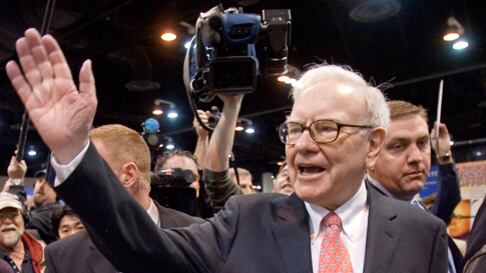
In 2000, near the peak of the Internet bubble, the standard critique of Berkshire Hathaway Chairman Warren Buffett and Vice Chairman Charlie Munger was that they failed to foresee and appreciate the rise of the “new economy” and were irrationally clinging to their boring “old economy” companies that were surely destined for the dustbin of history. Today, critics charge, Buffett and Munger failed to foresee and fully appreciate the impact of the bursting of the housing bubble and the resulting credit crunch and severe recession. Much of this year's meeting was spent struggling to reassure investors that the new batch of critics will ultimately be proved just as wrong about the company's long-term prospects.
“I was disappointed when Moody’s downgraded us... We think we’re triple-A and we run it so nobody is stronger than us. We treat our obligations as sacred. I would say the Moody’s downgrade won’t be material for Berkshire, but still it irritates me.”
Before I dive into some of the specific things Buffett and Munger said during Saturday's daylong meeting, I want to share two big impressions: First, despite their advanced years—Buffett is 78 and Munger is 85—they show no signs whatsoever of slowing down. To the contrary, I’ve never seen them more engaged, energetic, witty, and thoughtful. Mentally, they are at the top of their games and seem to be getting better with age. Second, I'm struck by their consistency. Despite the chaotic external environment dominated by the worldwide economic crisis, as well as Berkshire’s declining earnings and share price, Buffett and Munger are calm, cool, collected, and haven’t changed their timeless investment style one iota. Below, my observations on the five most interesting moments from the meeting.
1. Why IQ Is Irelevant
At every annual meeting, Buffett and Munger reinforce their guiding principles: Focus solely on intrinsic value and seek to buy with a huge margin of safety, taking advantage of other investors’ irrationality. Buffett commented that “Picking [stock market] bottoms isn’t our game. Pricing is our game. It’s not so difficult, whereas picking bottoms is impossible.”
He continued: “To be a successful investor, you don’t need to understand higher math or law. It’s simple, but not easy. You do have to have an emotional stability that will take you through almost anything. If you have 150 IQ, sell 30 points to someone else. You need to be smart, but not a genius. What’s most important is inner peace; you have to be able to think for yourself. It’s not a complicated game.”
Munger added: “There is so much that is false and nutty in modern investment practice. If you just reduce the nonsense, you’ll do well. If you think your IQ is 160 but it’s 150, you’re a disaster. It’s much better to have a 130 IQ and think it’s 120.”
Later, in response to another question, Munger warned that businesses with truly sustainable competitive advantages are increasingly rare and noted, “Unfortunately, a lot of [competitive] moats are filling up with sand, such as daily newspapers and network television stations.”
2. Breaking the Rules on Wells Fargo
Buffett and Munger spoke at great length about Wells Fargo, praising its management team, the company’s low cost of capital, etc. Munger concluded, “I think Wells Fargo is going to come out of this [economic crisis] way stronger.” Buffett agreed, saying, “When Wells Fargo’s stock fell below $9, I broke my rule about not talking about specific stocks and told a group of students visiting me that day that if I had to put my entire net worth into one stock, that would be it.”
They usually don’t like to publicly discuss any stocks Berkshire owns, but I think there are two reasons why they made a rare exception Saturday. First, at $6.1 billion, this is Berkshire’s second-largest stock position (after Coca-Cola, at $8.5 billion), and the stock has been on a wild ride recently, falling from $30 in January to a low of $7.80 in March, before rebounding to today’s $19.61, so they wanted to assure shareholders that Wells Fargo is an excellent company and the stock is attractively undervalued.
Second, an even more important audience than Berkshire’s shareholders are Wells Fargo’s regulators, who are putting the company through the government’s “stress test.” Buffett and Munger strongly believe that Wells is sufficiently strong and profitable that it doesn’t need to raise more capital, but if the regulators disagree, they could mandate that Wells do so, which could be disastrous for Wells Fargo shareholders like Berkshire. Thus, I think Buffett and Munger are trying to subtly communicate their point of view to regulators. (I agree with Buffett and Munger and also own the stock, for reasons outlined in my new book, More Mortgage Meltdown: 6 Ways to Profit in These Bad Times.)
3. Moody’s Was Wrong
So if Berkshire is so strong—which Buffet and Munger repeatedly stressed—why did Moody’s strip the company of its coveted triple-A rating? Buffett and Munger’s answer is simple: Moody’s made a mistake. Buffett commented: “I was disappointed when Moody’s downgraded us. We didn’t think it was going to happen, but it did…We think we’re triple-A and we run it so nobody is stronger than us. We treat our obligations as sacred. I would say the Moody’s downgrade won’t be material for Berkshire, but still it irritates me.”
Munger added: “At least they showed some independence. I think the next change at Moody’s will be in the opposite direction because we deserve it and they’re smart.”
4. New Warning on Debt
Buffett and Munger have long warned about the dangers of too much debt. Buffett noted: “Leverage is what causes people real trouble in this world. You don’t want to be in a position where someone can pull the rug out from under you or, emotionally, where you pull it out from under yourself.”
Later, Buffett explained that he and Munger never want to come anywhere close to a dangerous financial situation, preferring instead to be “comfortable—and our definition of comfortable is really comfortable. We want to have billions and billions and billions of dollars around.”
At one point, he explained Berkshire’s derivatives positions and made a compelling argument that these bets will prove to be big winners.
5. Fixing the Energy Crisis
Thanks in part to the new battery technology being developed by BYD, a Chinese manufacturer that Berkshire bought 10 percent of last year, Munger says he believes that our energy crisis will be fixed in the foreseeable future: “The main technical problem of mankind is about to be fixed. This is extremely important because if you have enough energy, you can fix a lot of the other problems.”
Whitney Tilson co-manages the T2 Partners hedge funds and the Tilson Focus Fund mutual fund, co-founded the Value Investing Congress and investment newsletter Value Investor Insight, and co-authored the just-released book, More Mortgage Meltdown: 6 Ways to Profit in These Bad Times.






